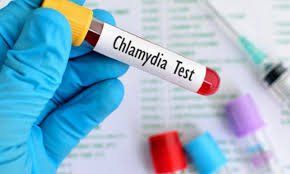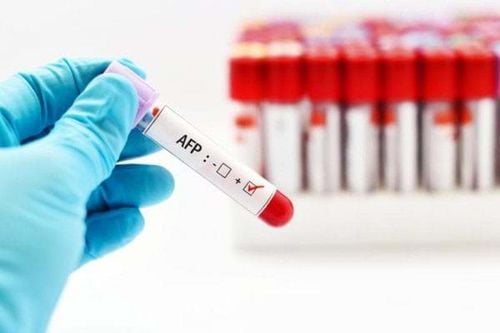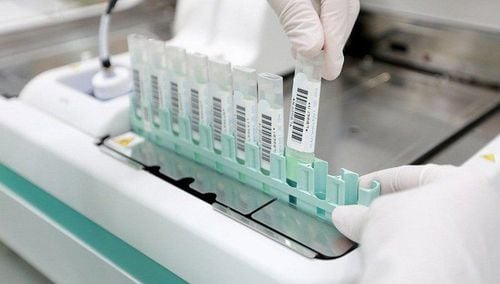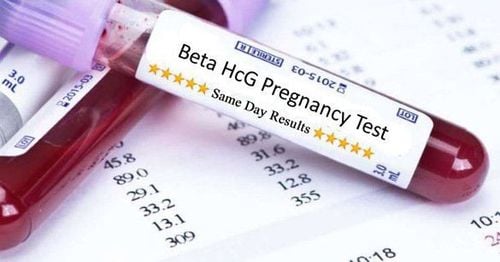This is an automatically translated article.
Chlamydia is a sexually transmitted disease caused by the bacteria chlamydia trachomatis. It causes serious and permanent damage to the reproductive systems of women and men. Therefore, it is very important to diagnose the disease in time for treatment, one of the methods to diagnose the disease is the chlamydia IgG test and the chlamydia IgA test.
1. What are Chlamydia IgG and Chlamydia IgA tests?
Chlamydia IgG test and Chlamydia IgA test is a test that uses a patient's serum sample, thereby helping to detect Chlamydia IgG and Chlamydia IgA antibodies in the serum sample to diagnose Chlamydia in the body when not have symptoms or the disease is in an acute state.
Chlamydia IgG test method to diagnose Chlamydia disease has a sensitivity of 95.3% and a specificity of 98.2%. Chlamydia IgA test for diagnosis of Chlamydia has a sensitivity of 95.4% and a specificity of 95.9%.
On the advantages of this test method:
Effective with large screening scale; There is no requirement on whether the bacteria are alive or not; Testing is cheaper than culture and requires moderate testing skills. However, this test has the following disadvantages:
It cannot be used with many types of samples taken from the colon or respiratory and vaginal organs. Because it reduces sensitivity and specificity for these samples, it should only be used to screen populations with a low positive rate (≤ 5%).
2. When should a Chlamydia test be performed?
Chlamydia is a sexually transmitted disease caused by bacteria known scientifically as chlamydia trachomatis. This disease is quite common in both men and women. The disease will cause serious and permanent damage to the reproductive system of women and men such as cervicitis, urethral inflammation and more dangerously, infertility.There are 3 main types of Chlamydia, namely Chlamydia psittaci, Chlamydia pneumoniae and Chlamydia trachomatis. However, in addition to sexual transmission, Chlamydia can also be transmitted through direct contact between the baby and the mother's cervix during childbirth. Therefore, in the following cases, the patient needs to go to reputable medical facilities to conduct a diagnosis of chlamydia:
Women who are pregnant or planning to become pregnant. Subjects often have unprotected sex, or have unprotected sex with a new partner. People with or suspected of having sexually transmitted diseases or people who often experience inflammatory diseases, pelvic or vaginal disorders. You or your partner have symptoms of chlamydia; If you have sex with a new partner or have unprotected sex and your condom breaks, you should get tested for chlamydia. You and your partner have unprotected sex with another partner or your partner has an STI.

Phương pháp xét nghiệm Chlamydia IgG để chẩn đoán bệnh Chlamydia có độ nhạy 95.3% và độ đặc hiệu 98.2%
3. Procedure for taking samples for testing
Urine sample taken to test for chlamydia: The patient should not urinate within 2 hours before collecting the sample. Vaginal fluid sample: If a vaginal fluid sample is taken, depending on where the patient has an infection, the fluid sample will be taken from there, for example, from the urethra, vagina, or rectum ,... Therefore, in this case, the patient should not douche or use topical medications and gels in the vagina at least 24 hours before taking samples for testing. The doctor will need to wash and clear the cervical mucus, then instruct the patient to lie in the obstetric position, expose the cervix and use a vaginal speculum, a sterile cotton swab to insert and remove. sample for about 30 seconds. Blood samples: If taking blood samples for testing, the samples need to be stored in specialized tubes to ensure sample quality. In case of suspected acute chlamydia infection, after about 2-3 weeks, the patient will have to take additional samples to conduct tests, thereby giving the most accurate results.
4. Notes Before and After Testing for Chlamydia
Before the test: If the woman is on her menstrual cycle or who is taking antibiotics, it is necessary to inform the doctor before the test for guidance. Because these factors can affect the test results, the diagnosis is also misleading. After the test: Once the test is done until the doctor's decision is made, you should not have sex. If unfortunately the test result is positive, the patient needs to take medicine as prescribed by the doctor, the main drugs are antibiotics for treatment. At least 7 days of treatment, the patient should also not have sex because the possibility of sexually transmitted infection is still high. Not only Chlamydia disease but also many other bacteria and viruses that can be sexually transmitted such as syphilis, gonorrhea, etc. Therefore, when you notice the symptoms of the disease, you need to go to a medical facility for timely examination and treatment.
Currently, to help customers detect and treat other gynecological diseases early, Vinmec International General Hospital has a basic gynecological examination and screening package, helping customers detect diseases early. Infections are easy and inexpensive to treat. Screening detects gynecological cancer (cervical cancer) early even when there are no symptoms.
Basic gynecological examination and screening package for female customers, has no age limit and may have the following symptoms:
Abnormal vaginal bleeding Having menstrual problems: irregular menstrual cycle, irregular menstrual cycle Irregular vaginal discharge (smell, different color) Vaginal pain and itching Female clients have several risk factors such as poor personal hygiene, Unsafe sex, abortion,... Female customers have other symptoms such as: Abnormal vaginal discharge, itching, pain in the intimate area, abnormal vaginal bleeding. When registering for the Basic Gynecological Examination and Screening Package, customers will receive:
Gynecological Specialist Examination Transvaginal Uterine Ovarian Ultrasound Vaginal Bilateral Breast Ultrasound Tests such as: Treponema pallidum test rapid, Chlamydia rapid test, taking samples for cervical-vaginal cytology, bacterioscopic staining (female vaginal fluid), HPV genotype PCR automated system, Urinalysis by automatic machine.
Please dial HOTLINE for more information or register for an appointment HERE. Download MyVinmec app to make appointments faster and to manage your bookings easily.













